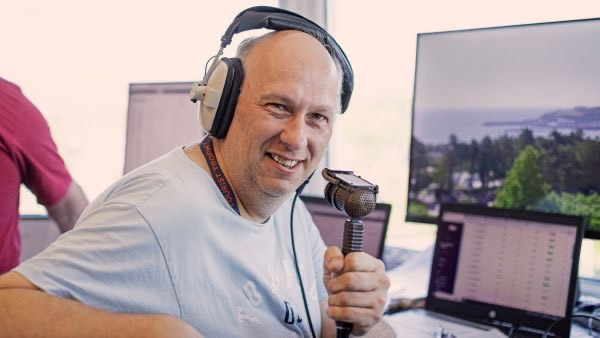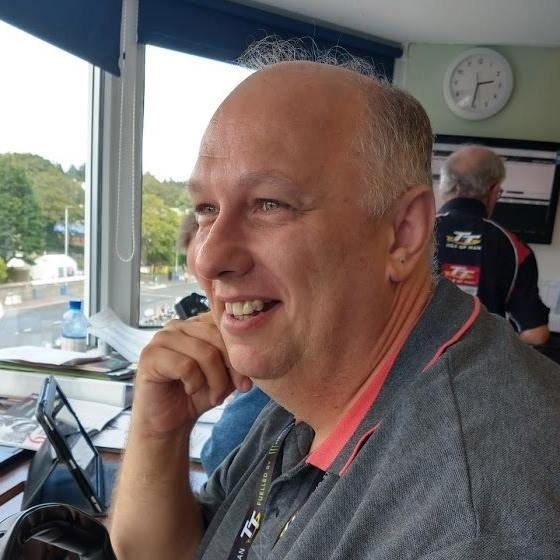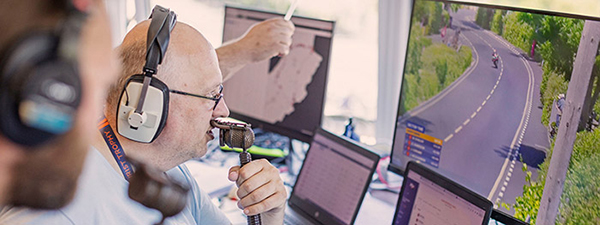Dealing Technician Chris’s double life in the TT fast lane
Chris Boyde is a Chartered MCSI working as a Dealing Technician with the Investments Department at International Financial Group Limited (IFGL), the company which owns RL360, the TT’s longest running sponsor.

He is also part of the Radio TT commentary team and, this year, will take the microphone as lead commentator for the first time.
Here, Chris explains what it’s like to hold such an integral role at the world’s greatest motorcycle road race.
How long have you been commentating on the TT?
I’ve been reporting on the TT since 2002 and became the podium press conference host in 2014 and part of the official commentary team from 2015, as chief analyst, using self-written projection programs to make full use of the sector times to undertake lap by lap comparisons and lap speed projections to add to the commentary.
How did you get involved?
It was gradual over time really, and stems from my involvement in rallying as a competitor, organiser and undertaking media roles with newspapers and radio stations. That has taken me to every corner of the UK reporting on events, from TV work on the Isle of Mull, to local radio work in Northern Ireland, World Championship reporting from Wales and British Championship events across the UK.
I am fortunate to count several motorsports and broadcast professionals as good friends, and the training and pointers they have provided have been invaluable.
When Energy FM started broadcasting, they wanted to carry TT coverage and that is when I became involved. We were upstarts in the unique environment that was the TT Press Office with some giants of motorcycle journalism, such as John Brown, Norrie Whyte and Dave Fern. You soon learnt your place, but it was amazing fun too!
I have commentated at both Glen Helen and Ramsey Hairpin along the way, including being in the Ramsey commentary box in 2017 when it was shunted backwards as part of a collision between two bikes!
Where do you work from during the racing?
We are very fortunate to have one of the best seats there is, high up in the main TT Grandstand Tower, looking down on the famous Glencrutchery Road and the pit lane where races can be won and lost, with the podium in front of us, the start/finish to our right and the road stretching down to St Ninian's and the top of Bray Hill to our left.
Most importantly for keeping an eye on the weather, we can also see right out to South Barrule, along the valley out towards Peel and across the hill range in the centre of the island.

Do you take time off to do it?
Between TT and Manx Grand Prix commitments, half of my annual leave from my position with IFGL (RL360’s parent company) is accounted for.
In the past I have dovetailed full days at work with the TT, as holidays across the team during TT are obviously in high demand. This can often mean being on the go from 6am til near midnight, by the time I’ve got home from an evening practice and undertaken preparation work for the next day, ready to be up at 6am to do it all over again.
It’s full on but worth it, though I feel it by the time we come to the Senior TT to complete the event!
Have you ever done anything similar before?
The TT is unique, there’s nothing else like it!
But reporting on rallying is a natural stepping stone, as that’s a sport that takes place often over several days and the action comes in stages, building to the overall result, so similar to the sector by sector results we work with at TT.
Being used to storytelling in that way is a great foundation for the TT, albeit that everything happens a lot more quickly!
On the 2017 Rally Isle of Man, the British Rally title was decided on the final stage by one tenth of a second, the smallest margin you can have. I was on air live covering the finish on radio, there were other radio stations live, TV crews and the drivers themselves all looking over my shoulder as I rapidly did the maths on the back of a stage list to work out who had won as it was so close. Thankfully I got it right!
In terms of doing the sums and making a call based on that, on the spot, it is stressful but also a buzz.
We also become involved in other events, for example I have covered the last four Isle of Man General Elections for local media, including one night making it to seven different constituencies to interview our newly elected politicians. Those nights can be helter-skelter, plans go out of the window very quickly!
Is there such thing as an average day at the TT?
The role is all year round really, as soon as we come off one race meeting, I begin updating all the of the stats and rider profiles and re-preparing the projection programs ready for the next.
For the races, the work starts the day before once the start sheets are released. I can then build the commentators’ call sheets and create the race program with details such as the sector times for the fastest practice laps, the lap record for that class, previous year’s fastest laps, all building to an ‘indication’ set of numbers that I will then use for opening lap projections and on from there throughout the race, sector by sector.
The commentary team are at the TT Grandstand very early, so if there are delays the days can become very long, but once we are on air they are so well practised at what they do that it flows brilliantly.
In the commentary box there is the commentator, at least one pundit, producer, editor, mixer and technician, plus guests from time to time, as well as me, so it can feel quite cramped, especially when we add in mixing desks and multiple laptops, double monitors and the livestream footage all in front of us to give us all the data we need!
I look after the weather and scheduling, including keeping an eye on the weather radar, and as a race start approaches there is a real buzz in the commentary box.
Somewhere along the line I also need to have a think about what I’m going to say!
As soon as the first sector times come in from Glen Helen, I’m analysing those and then refining that as the lap progresses and more and more data becomes available.
The pitstops are a real pressure point, as I try to deliver pitstop ‘out’ leaderboards manually, based on the positions coming into the stops, which can be ever-changing, and the pitstop times themselves, whilst trying to listen to Chris Kinley and the reporters down in pit lane and the paddock bringing us all the action.
The real skill to it all though is not in producing the numbers particularly, it’s working out which of those details will help tell the story of the race, which will add something for the listener’s understanding of what is happening, be they on the Grandstand right below us, out on a hedge around the course or listening on the other side of the world!
And if it’s all gone well, a pint is always welcome to end the day!
What’s the best thing about your role?
As a Manxman, I’ve grown up with the TT and MGP, and some of my earliest memories are of being woken up at the family home in Union Mills at 5.15am by morning practices (no longer held) or waiting for Peter Kneale to call the riders off the startline of a race and running full pelt down to The Railway pub in order to catch them coming through!
To now be sat in the same seat as Peter and Geoff Cannell once sat, the great voices of TT commentary in my lifetime, is an incredible honour and very daunting.
What’s the worst thing about your role?
There can be difficult days at the TT, thankfully the team support one another, and you go away and try to process things.
What’s the most unusual thing you’ve had to commentate on?
Animals! We’ve had dogs and ducks on the course delaying things, we’ve had a household fire in Kirk Michael alongside the course, oil dropped by vehicles just before the roads close and IT failures, even beyond weather delays. It is a living, breathing course and it always amazes me that within minutes of having been a race circuit, the course is back to everyday public use with lorries and tractors etc, until the next time.
Last year we had Channing Tatum amongst the visitors to the commentary box, except I must have been about the only person on the island who completely failed to recognise him, so one of his entourage received a full briefing on what we do and how we do it, ha!
What are your greatest memories of the TT?
Every year brings its own highlights and memories, often moments away from the racing itself, such as getting John McGuinness and his wife Becky into the press centre for a moment to themselves almost two hours after a race finish and still in his full leathers after being mobbed non-stop by fans.
Or the podium press conferences where tears flow as the reality starts to hit riders of what they’ve just achieved and their own story to get to that very point, it can be quite emotional.
How do you cope with the pressure on air (or do you even feel pressure)?
I absolutely feel it. When I first took over the podium press conferences, I was grateful they only asked me the night before at the end of practice week, as it meant I only lost one night’s sleep!
I do get very nervous, I’m conscious that I’m very fortunate to be an amateur in a team of broadcast professionals and am equally conscious that the audience are very knowledgeable and passionate about the TT, so you have to try to provide a commentary to meet their expectations, which adds its own pressure.

How does your day job compare with your TT job?
Both are about delivering for the ‘audience’, in my day job providing the very best service we can to policyholders and advisers, at the TT delivering the most comprehensive and entertaining coverage of an event that is close to so many people’s hearts, worldwide.
The core skills that I use at TT, looking at multiple sets of data at once, and trying to pare those down to what really matters, crossover from my work in investments and dealing, which can often involve time critical decisions based on available data/prices/market conditions etc.
What does the TT mean to you?
It’s an event that has been there my entire life, like bookmarks along the way. I can remember getting sidecar ace Jock Taylor’s autograph when I was 6 or 7, watching Mike Hailwood’s return in 1978 from our back garden overlooking the Ballahutchin Hill run out of Union Mills, being almost alongside Joey Dunlop setting off on a very wet practice lap with a slick tyre, and on from there.
It is part of the fabric of life on the island, and is part of my life all year round, always hoping I’ll be asked to be involved next year again, but never really thinking I am good enough to be called.